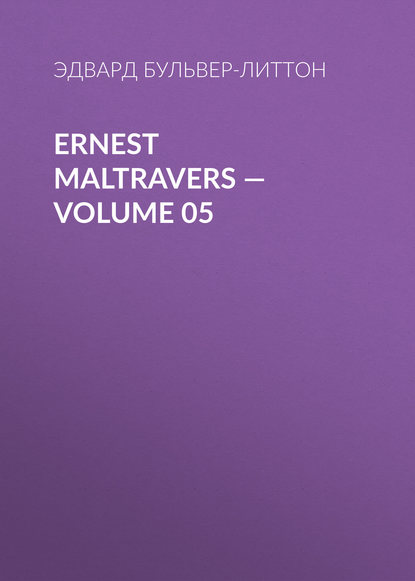По всем вопросам обращайтесь на: info@litportal.ru
(©) 2003-2024.
✖
Ernest Maltravers — Volume 05
Настройки чтения
Размер шрифта
Высота строк
Поля
"Tell me, sir,
Have you cast up your state, rated your land,
And find it able to endure the charge?"
/The Noble Gentleman/.
By degrees, as Maltravers sobered down from the first shock of that unexpected meeting, and from the prolonged disappointment that followed it, he became sensible of a strange kind of happiness or contentment. Alice was not in poverty, she was not eating the unhallowed bread of vice, or earning the bitter wages of laborious penury. He saw her in reputable, nay, opulent circumstances. A dark nightmare, that had often, amidst the pleasures of youth, or the triumphs of literature, weighed upon his breast, was removed. He breathed more freely—he could sleep in peace. His conscience could no longer say to him, "She who slept upon thy bosom is a wanderer upon the face of the earth—exposed to every temptation, perishing perhaps for want." That single sight of Alice had been like the apparition of the injured Dead conjured up at Heraclea—whose sight could pacify the aggressor and exorcise the spectres of remorse. He was reconciled with himself, and walked on to the Future with a bolder step and a statelier crest. Was she married to that staid and sober-looking personage whom he had beheld with her? was that child the offspring of their union? He almost hoped so—it was better to lose than to destroy her. Poor Alice! could she have dreamed, when she sat at his feet gazing up into his eyes, that a time would come when Maltravers would thank Heaven for the belief that she was happy with another?
Ernest Maltravers now felt a new man: the relief of conscience operated on the efforts of his genius. A more buoyant and elastic spirit entered into them—they seemed to breathe as with a second youth.
Meanwhile, Cesarini threw himself into the fashionable world, and to his own surprise was /feted/ and caressed. In fact, Castruccio was exactly the sort of person to be made a lion of. The letters of introduction that he had brought from Paris were addressed to those great personages in England between whom and personages equally great in France politics makes a bridge of connection. Cesarini appeared to them as an accomplished young man, brother-in-law to a distinguished member of the French Chamber. Maltravers, on the other hand, introduced him to the literary dilettanti, who admire all authors that are not rivals. The singular costume of Cesarini, which would have revolted persons in an Englishman, enchanted them in an Italian. He looked, they said, like a poet. Ladies like to have verses written to them, and Cesarini, who talked very little, made up for it by scribbling eternally. The young man's head soon grew filled with comparisons between himself in London and Petrarch at Avignon. As he had always thought that fame was in the gift of lords and ladies, and had no idea of the multitude, he fancied himself already famous. And, since one of his strongest feelings was his jealousy of Maltravers, he was delighted at being told he was a much more interesting creature than that haughty personage, who wore his neckcloth like other people, and had not even those indispensable attributes of genius—black curls and a sneer. Fine society, which, as Madame de Stael well says, depraves the frivolous mind and braces the strong one, completed the ruin of all that was manly in Cesarini's intellect. He soon learned to limit his desire of effect or distinction to gilded saloons; and his vanity contented itself upon the scraps and morsels from which the lion heart of true ambition turns in disdain. But this was not all. Cesarini was envious of the greater affluence of Maltravers. His own fortune was in a small capital of eight or nine thousand pounds: but, thrown in the midst of the wealthiest society in Europe, he could not bear to sacrifice a single claim upon its esteem. He began to talk of the satiety of wealth, and young ladies listened to him with remarkable interest when he did so—he obtained the reputation of riches—he was too vain not to be charmed with it. He endeavoured to maintain the claim by adopting the extravagant excesses of the day. He bought horses—he gave away jewels—he made love to a marchioness of forty-two, who was very kind to him and very fond of /ecarte/—he gambled—he was in the high road to destruction.
notes
1
In the school of the world, as in that of love, it is necessary to begin by practising what we wish to learn.
2
I find that it is a folly to wish to study the world like a simple spectator.
3
What, under such happy auspices do you conceive that you may not repent of your endeavour and accomplished wish?
Другие электронные книги автора Эдвард Джордж Бульвер-Литтон
Другие аудиокниги автора Эдвард Джордж Бульвер-Литтон
Последние дни Помпеи




 4.67
4.67












